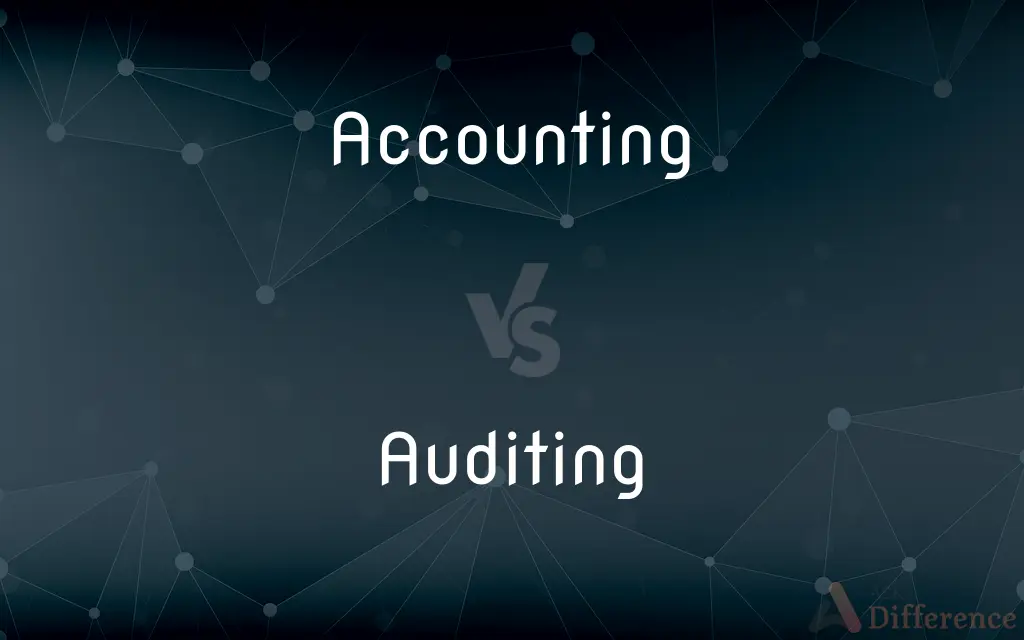Accounting vs. Auditing — What's the Difference?
By Tayyaba Rehman & Urooj Arif — Updated on March 12, 2024
Accounting involves recording and managing financial transactions, while auditing is the examination of those records to ensure accuracy and compliance.

Difference Between Accounting and Auditing
Table of Contents
ADVERTISEMENT
Key Differences
Accounting is a comprehensive process that entails recording, classifying, summarizing, and interpreting financial information about a business or an individual. It helps in tracking income, expenses, assets, and liabilities, enabling stakeholders to make informed financial decisions. Auditing, on the other hand, is an independent examination of financial information of any entity, whether profit-oriented or not, irrespective of its size or legal form when such an examination is conducted with a view to express an opinion thereon.
Accountants generate financial statements, such as the balance sheet, income statement, and cash flow statement, which reflect the financial status of an entity. Auditors assess the accuracy, completeness, and compliance of financial records and statements with applicable standards and regulations. They ensure that the financial statements provide a true and fair view of the entity's financial position.
The primary objective of accounting is to accurately record all financial transactions and present the financial position and performance of an entity through financial statements. Whereas, the main goal of auditing is to provide an unbiased opinion on whether the financial statements are free from material misstatement, whether due to fraud or error.
Accounting is an ongoing activity that takes place throughout the fiscal year, involving daily tasks such as journal entries, ledger postings, and trial balance preparation. Auditing, however, is a periodic activity, typically conducted at the end of the fiscal year, focusing on reviewing and verifying the accuracy of accounting records and statements.
The outcome of accounting work is the preparation of financial statements that reflect the entity's financial status. In contrast, the outcome of an auditing process is the auditor's report, which includes the auditor's opinion on the fairness and reliability of the financial statements.
ADVERTISEMENT
Comparison Chart
Definition
Process of recording and managing financial transactions.
Examination of financial records for accuracy and compliance.
Objective
To present financial status and performance.
To provide an opinion on financial statements.
Nature
Ongoing activity with daily tasks.
Periodic review and verification activity.
Outcome
Financial statements.
Auditor's report.
Focus
Internal management and external stakeholders.
External stakeholders, including investors and regulators.
Compare with Definitions
Accounting
Documenting financial transactions in the books of accounts.
Recording a sale involves updating the sales ledger and cash or receivables account.
Auditing
Conducting detailed checks of financial records.
Examining invoice records to verify recorded sales transactions.
Accounting
Consolidating detailed financial information.
Summarizing monthly expenses to present in an income statement.
Auditing
Confirming the accuracy and completeness of information.
Verifying the existence and valuation of inventory through physical counts.
Accounting
Presenting financial information to stakeholders.
Reporting annual financial performance through the income statement and balance sheet.
Auditing
Providing a conclusion on the financial statements' integrity.
Issuing an unqualified opinion if the financial statements present a true and fair view.
Accounting
Analyzing financial statements for decision-making.
Interpreting the debt-to-equity ratio to assess financial leverage.
Auditing
Ensuring adherence to accounting standards and regulations.
Checking if financial statements comply with Generally Accepted Accounting Principles (GAAP).
Accounting
Organizing transactions into categories.
Classifying expenses by nature such as rent, utilities, and salaries.
Auditing
Documenting the audit findings and opinions.
Preparing an auditor's report that summarizes the audit findings and the auditor's opinion on the financial statements.
Accounting
Accounting or accountancy is the measurement, processing, and communication of financial and non financial information about economic entities such as businesses and corporations. Accounting, which has been called the "language of business", measures the results of an organization's economic activities and conveys this information to a variety of users, including investors, creditors, management, and regulators.
Auditing
An examination of records or financial accounts to check their accuracy.
Accounting
The practice or profession of maintaining the financial records of a business, including bookkeeping as well as the preparation of statements concerning the assets, liabilities, and operating results.
Auditing
An adjustment or correction of accounts.
Accounting
Present participle of account
Auditing
An examined and verified account.
Accounting
(business) The development and use of a system for recording and analyzing the financial transactions and financial status of an individual or a business.
Auditing
A thorough examination or evaluation
An audit of water use.
Accounting
A relaying of events; justification of actions.
He was required to give a thorough accounting of his time.
Auditing
To examine, verify, or correct the financial accounts of
Independent accountants audit the company annually. The IRS audits questionable income tax returns.
Accounting
(law) An equitable remedy requiring wrongfully obtained profits to be distributed to those who deserve them.
Auditing
To attend (a course) without requesting or receiving academic credit.
Accounting
A convincing explanation that reveals basic causes;
He was unable to give a clear accounting for his actions
Auditing
To examine or evaluate (something) thoroughly
Audit a house's energy consumption.
Accounting
A system that provides quantitative information about finances
Auditing
To conduct an audit.
Accounting
The occupation of maintaining and auditing records and preparing financial reports for a business
Auditing
Present participle of audit
Accounting
A bookkeeper's chronological list of related debits and credits of a business; forms part of a ledger of accounts
Auditing
The act or result of performing an audit.
Accounting
A statement of recent transactions and the resulting balance;
They send me an accounting every month
Common Curiosities
How often should an audit be conducted?
Audits are typically conducted annually, but the frequency can vary based on regulatory requirements or stakeholder demands.
Who performs accounting and auditing tasks?
Accountants perform accounting tasks, whereas independent auditors or audit firms conduct audits.
What are Generally Accepted Accounting Principles (GAAP)?
GAAP refers to a set of accounting standards and practices that guide the preparation of financial statements.
Can auditing detect all types of fraud?
While auditing is designed to detect material misstatements, it may not uncover all types of fraud due to its inherent limitations.
Can an accountant also be an auditor?
Yes, an accountant can also be an auditor, but auditors must maintain independence from the entities they audit.
What is the main difference between accounting and auditing?
Accounting involves managing financial transactions, while auditing focuses on evaluating the accuracy of accounting records.
Is accounting only for businesses?
No, accounting is applicable to both businesses and individuals for financial tracking and planning.
Are financial statements necessary for an audit?
Yes, financial statements are essential for conducting an audit as they are the primary documents reviewed.
What is an auditor's report?
An auditor's report is a document that presents the auditor's findings and opinion on the entity's financial statements.
Do non-profit organizations need audits?
Yes, non-profit organizations often require audits to ensure financial transparency and accountability.
Can a small business benefit from auditing?
Yes, small businesses can benefit from auditing by enhancing credibility and ensuring financial statement accuracy.
What role do ethics play in accounting and auditing?
Ethics are crucial in maintaining integrity, objectivity, and professionalism in both accounting and auditing practices.
Can internal audits replace external audits?
Internal audits cannot replace external audits as they serve different purposes, with external audits providing an independent assessment of financial statements.
What does an unqualified audit opinion mean?
An unqualified opinion means the auditor believes the financial statements present a true and fair view without any significant misstatements.
How does technology impact accounting and auditing?
Technology streamlines accounting processes and enhances auditing efficiency through data analytics and automation.
Share Your Discovery

Previous Comparison
Decision vs. Resolution
Next Comparison
Appointment vs. ReservationAuthor Spotlight
Written by
Tayyaba RehmanTayyaba Rehman is a distinguished writer, currently serving as a primary contributor to askdifference.com. As a researcher in semantics and etymology, Tayyaba's passion for the complexity of languages and their distinctions has found a perfect home on the platform. Tayyaba delves into the intricacies of language, distinguishing between commonly confused words and phrases, thereby providing clarity for readers worldwide.
Co-written by
Urooj ArifUrooj is a skilled content writer at Ask Difference, known for her exceptional ability to simplify complex topics into engaging and informative content. With a passion for research and a flair for clear, concise writing, she consistently delivers articles that resonate with our diverse audience.
















































